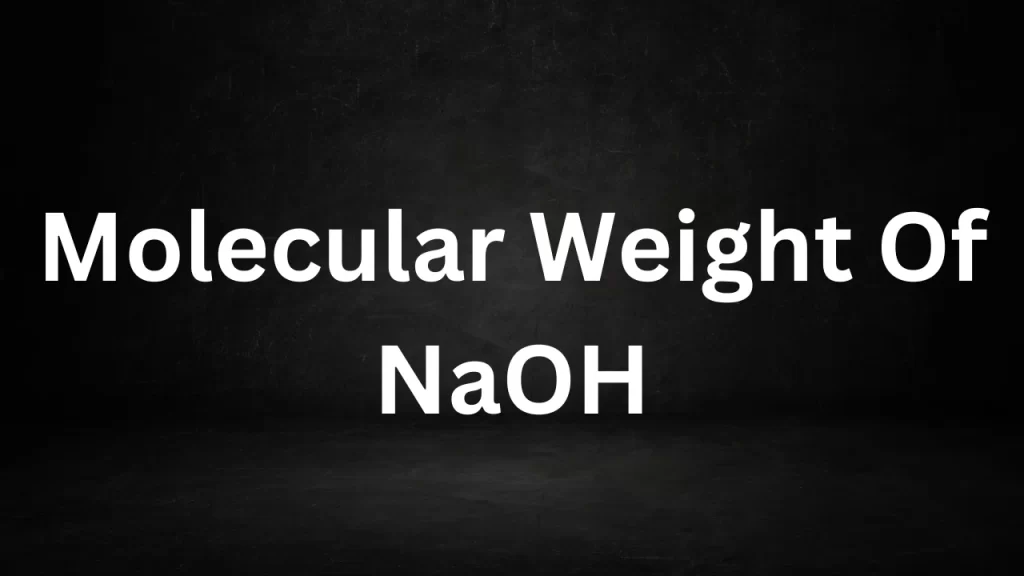Molecular Weight Of NAOH: The Molecular Weight of NaOH (Sodium Hydroxide) Understanding its Significance in Chemistry Chemistry, the study of matter and its properties, often involves the measurement and analysis of substances at the molecular level.

Molecular Weight Of NaOH
Defining Molecular Weight:
Molecular weight is a measure of the mass of a molecule, and it is expressed in atomic mass units (amu) or grams per mole (g/mol). It provides valuable information about the composition of a substance by summing up the atomic masses of all the atoms present in a molecule.
The Composition of NaOH:
Sodium hydroxide (NaOH) is a chemical compound composed of three elements: sodium (Na), oxygen (O), and hydrogen (H). Its chemical formula, NaOH, tells us that each molecule of sodium hydroxide contains one atom of sodium (Na), one atom of oxygen (O), and one atom of hydrogen (H).
Calculating the Molecular Weight of NaOH:
To find the molecular weight of NaOH, we need to add up the atomic weights of its constituent elements:
- Sodium (Na) has an atomic weight of approximately 22.99 g/mol.
- Oxygen (O) has an atomic weight of roughly 16.00 g/mol.
- Hydrogen (H) has an atomic weight of approximately 1.01 g/mol.
Now, let’s calculate the molecular weight of NaOH:
Molecular Weight (NaOH) = Atomic Weight (Na) + Atomic Weight (O) + Atomic Weight (H)
Molecular Weight (NaOH) = 22.99 g/mol + 16.00 g/mol + 1.01 g/mol
Molecular Weight (NaOH) ≈ 40.00 g/mol
The Significance of Molecular Weight:
Understanding the molecular weight of a compound like NaOH is crucial in various aspects of chemistry:
- Stoichiometry: Molecular weight is used to calculate the number of moles of a substance in a given sample. This is essential for determining the proportions of reactants and products in chemical reactions.
- Molar Mass: Molecular weight is also referred to as molar mass, and it represents the mass of one mole of a substance. This value is used extensively in chemical calculations.
- Formulas and Empirical Formulas: Molecular weight helps in determining the chemical formula of a compound and its empirical formula, which represents the simplest whole number ratio of its constituent atoms.
- Concentration Calculations: In solutions, the molecular weight of a solute is used to calculate its concentration in terms of molarity (moles per liter).
- Chemical Analysis: Molecular weight aids in identifying and quantifying substances through techniques like mass spectrometry and chromatography.
Practical Applications of Sodium Hydroxide:
Sodium hydroxide (NaOH) is a versatile chemical with numerous applications in various industries. It is commonly used in:
- Chemical Manufacturing: NaOH is a key ingredient in the production of various chemicals, including soaps, detergents, and pharmaceuticals.
- Food Processing: It is used in food preparation and production, particularly in the manufacture of products like pretzels and chocolate.
- Water Treatment: NaOH is employed to adjust the pH of water and wastewater in water treatment plants.
- Cleaning Products: It is a vital component of household cleaning products, as it effectively dissolves grease and oils.
- Petroleum Industry: NaOH plays a role in refining petroleum products and removing impurities.
- Paper and Pulp Industry: It is used to break down lignin in wood fibers during the papermaking process.
Understanding the molecular weight of NaOH and its properties allows for precise and controlled use in these applications.
In Conclusion:
The moleculars weight of NaOH, approximately 40.00 g/mol, provides a fundamental insight into the composition of this chemical compound.
Read More
- Difference Between Force And Pressure
- Difference Between Diode And Rectifier
- Difference Between AM And FM
- Dielectric Material And Dipole Moment
- Difference Between Centre Of Gravity And Centroid
Frequently Asked Question (FAQs) Molecular Weight Of NaOH
What is the molecular weight of NaOH?
The moleculars weight of sodium hydroxide (NAOH) is approximately 40.00 grams per mole (g/mol). This value is calculated by adding the atomic weights of the constituent elements: sodium (Na), oxygen (O), and hydrogen (H).
Why is it important to know the molecular weight of NaOH?
Knowing the moleculars weight of NaOH is essential in chemistry and science in general because it helps in various calculations, including molar mass, stoichiometry, and determining the amount of a substance in a given sample.
How can I calculate the molecular weight of other compounds?
To calculate the molecular weight of any compound, add up the atomic weight of all the atoms in the compound according to their chemical formula. You can find atomic weights on the periodic table. Multiply the atomic weight of each element by the number of atoms of that element in the compound, and then sum these values.
Is the molecular weight of NaOH the same as its molar mass?
Yes, in chemistry, the terms “molecular weight” and “molar mass” are often used interchangeably. They both refer to the mass of one mole of a substance in grams. So, the moleculars weight of NaOH is also its molar mass.
Why is NaOH commonly referred to as “caustic soda”?
Sodium hydroxide (NaOH) is commonly known as “caustic soda” because it is a highly caustic and corrosive substance. It has the ability to burn or corrode various materials and is used in a wide range of industrial applications, including in the production of soaps, detergents, and cleaning agents.
